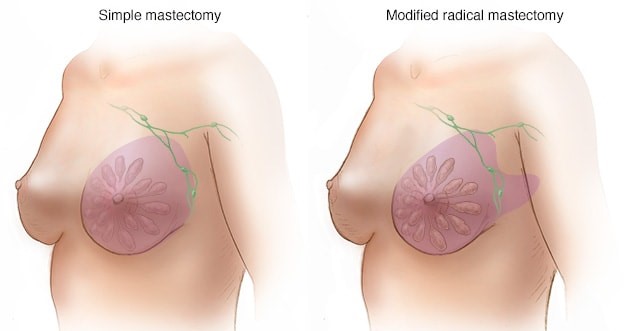A nurse is caring for a client who is 4 days postoperative following a right radical mastectomy. Which of the following activities should the nurse anticipate being the most difficult for this client to perform with her right hand?
Brushing her teeth
Buttoning her blouse
Eating her breakfast
Combing her hair
The Correct Answer is D
Choice A reason: Brushing teeth does not require much strength or range of motion in the hand, so it should not be very difficult for the client.
Choice B reason: Buttoning a blouse can be done with one hand or with the help of the other hand, so it should not be very difficult for the client.
Choice C reason: Eating breakfast can be done with the left hand or with utensils that are easy to hold, so it should not be very difficult for the client.
Choice D reason: Combing hair requires lifting the arm above the shoulder and moving the hand through the hair, which can be painful and challenging for the client who had a mastectomy and may have impaired lymphatic drainage and nerve damage in the right arm.

Nursing Test Bank
Naxlex Comprehensive Predictor Exams
Related Questions
Correct Answer is ["20"]
Explanation
- To find out how many gtt/min to set for a manual IV infusion, we need to use this formula: gtt/min = (mL/hr x drop factor) / 60
- In this formula, mL/hr is the rate of infusion in milliliters per hour, drop factor is the number of drops per milliliter for a specific IV tubing, and 60 is the number of minutes in an hour.
- We plug in the given values into this formula: gtt/min = (120 mL/hr x 10 gtt/mL) / 60
- We simplify and solve this equation: gtt/min = (1200 gtt/hr) / 60
- We divide both sides by 60: gtt/min = 20 gtt/hr
- We round off to the nearest whole number: gtt/min = **20**
- We add a leading zero if needed: gtt/min = **20**
- We do not add a trailing zero: gtt/min = **20**
Correct Answer is ["A","C","E"]
Explanation
Choice A: Sleep disturbances are the correct answer because they are a symptom of a heart attack observed in women. Sleep disturbances are problems that affect the quality or quantity of sleep, such as insomnia, nightmares, or snoring. They can indicate that the heart is not pumping enough blood and oxygen to meet the body's needs during sleep. About 48% of women who have had a heart attack report having sleep disturbances in the weeks before their event.
Choice B: Syncope is not the correct answer because it is not a symptom of a heart attack observed in women. Syncope is a condition that causes a temporary loss of consciousness due to a drop in blood pressure or blood flow to the brain. It can be caused by various factors such as dehydration, medication side effects, or cardiac arrhythmias. However, it is not a common sign of a heart attack in women, and only about 12% of women who have had a heart attack report having syncope before their event.
Choice C: Unusual fatigue is the correct answer because it is a symptom of a heart attack observed in women. Unusual fatigue is a feeling of extreme tiredness or exhaustion that is not relieved by rest or sleep. It can indicate that the heart is not pumping enough blood and oxygen to meet the body's needs during daily activities. About 70% of women who have had a heart attack report having unusual fatigue in the weeks before their event.
Choice D: Extreme hunger is not the correct answer because it is not a symptom of a heart attack observed in women. Extreme hunger is a feeling of intense or excessive appetite or craving for food. It can be caused by various factors such as diabetes, thyroid disorder, or stress. However, it is not a sign of a heart attack in women, and only about 4% of women who have had a heart attack report having extreme hunger before their event.
Choice E: Arm pain is the correct answer because it is a symptom of a heart attack observed in women. Arm pain is a feeling of discomfort or ache in one or both arms, especially the left arm. It can indicate that the heart muscle is not receiving enough blood and oxygen due to a blocked coronary artery. About 42% of women who have had a heart attack report having arm pain before their event.
Whether you are a student looking to ace your exams or a practicing nurse seeking to enhance your expertise , our nursing education contents will empower you with the confidence and competence to make a difference in the lives of patients and become a respected leader in the healthcare field.
Visit Naxlex, invest in your future and unlock endless possibilities with our unparalleled nursing education contents today
Report Wrong Answer on the Current Question
Do you disagree with the answer? If yes, what is your expected answer? Explain.
Kindly be descriptive with the issue you are facing.
